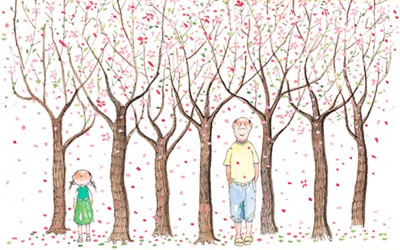(单词翻译:单击)

I am so surprised sometimes to notice that my sister is a wife and a mother, and I am not. Somehow I always thought it would be the opposite. I thought it would be me who would end up with a houseful of muddy boots and hollering kids, while Catherine would be living by herself, a solo act, reading alone at night in her bed. We grew up into different adults than anyone might have foretold when we were children. It's better this way, though, I think. Against all predictions, we've each created lives that tally with us. Her solitary nature means she needs a family to keep her from loneliness; my gregarious nature means I will never have to worry about being alone, even when I am single. I'm happy that she's going back home to her family and also happy that I have another nine months of traveling ahead of me, where all I have to do is eat and read and pray and write.
有时候我很讶异为人妻母的是我姐姐,而不是我。我一直认为应当反过来才是。我以为有一屋子小孩叫叫嚷嚷的人应当是我,凯瑟琳则是独自一人过日子,晚上一个人躺在床上读书。我们与小时候所有人所预期的完全相反。尽管如此,我认为这样比较好。违反一切预期,我们各自创造出符合自己的生活。她的孤寂天性,意味着需要家庭让她免于寂寞;而我的群居天性,则意味着永远无须担心孤单一个人,即使单身未婚。我很高兴她回到家人身边,也很高兴我还有九个月的旅行在等待我,而在这整段期间内,我只须吃饭、读书、祈祷、写作。
I still can't say whether I will ever want children. I was so astonished to find that I did not want them at thirty; the remembrance of that surprise cautions me against placing any bets on how I will feel at forty. I can only say how I feel now—grateful to be on my own. I also know that I won't go forth and have children just in case I might regret missing it later in life; I don't think this is a strong enough motivation to bring more babies onto the earth. Though I suppose people do reproduce sometimes for that reason—for insurance against later regret. I think people have children for all manner of reasons—sometimes out of a pure desire to nurture and witness life, sometimes out of an absence of choice, sometimes in order to hold on to a partner or create an heir, sometimes without thinking about it in any particular way. Not all the reasons to have children are the same, and not all of them are necessarily unselfish. Not all the reasons not to have children are the same, either, though. Nor are all those reasons necessarily selfish.
我依然不能断言自己想不想生孩子。我在三十岁的时候,讶异地发现我不要孩子;回顾当时的讶异,让我也不敢担保四十岁时的感觉。我只能说当下的感觉——衷心感谢今天的我是独自一人。我还知道我不会因为害怕晚年后悔,而勇往直前去生孩子;我认为这个动机并不够强大到让这个世界有更多的孩子。尽管我猜想人们有时为了这个理由而生孩子——确保将来不后悔。我想人们生孩子有各式各样的理由——有时纯粹想要养育、目睹生命,有时出于缺乏选择,有时为了抓住伴侣或延续香火,有时并不特别考虑任何理由。生孩子的理由并非都相同,也不尽然都是无私的理由。不生孩子的理由也并非都相同,也不尽然都是自私的理由。
I say this because I'm still working out that accusation, which was leveled against me many times by my husband as our marriage was collapsing—selfishness. Every time he said it, I agreed completely, accepted the guilt, bought everything in the store. My God, I hadn't even had the babies yet, and I was already neglecting them, already choosing myself over them. I was already a bad mother. These babies—these phantom babies—came up a lot in our arguments. Who would take care of the babies? Who would stay home with the babies? Who would financially support the babies? Who would feed the babies in the middle of the night? I remember saying once to my friend Susan, when my marriage was becoming intolerable, "I don't want my children growing up in a household like this." Susan said, "Why don't you leave those so-called children out of the discussion? They don't even exist yet, Liz. Why can't you just admit that you don't want to live in unhappiness anymore? That neither of you does. And it's better to realize it now, by the way, than in the delivery room when you're at five centimeters."
我之所以这么说,是因为我仍持续思考,在婚姻日渐崩溃的时候,我先生多次针对我提出的控诉——自私。每回他这么说,我都完全同意,承认罪过,买全部的账。天啊,我甚至还没生孩子,却已在忽略他们,已决定不选择他们 ,而去选择自己。我已经是个坏母亲。这些孩子——这些有名无实的孩子——经常出现在我们的争论中。谁来照顾这些孩子?谁和这些孩子待在家中?谁来赚钱养这些孩子?谁半夜起床喂孩子?我记得在我的婚姻已叫人难以忍受的时候,我曾对我的朋友苏珊说:我不想让我的孩子在这样的家庭长大。苏珊说:为什么不把这些所谓的孩子排除在讨论之外?他们根本还不存在呀,小莉。为什么不承认你只是不想再过不快乐的生活?你们两人都不想过啊。而且最好现在就搞清楚,而不是进产房的时候才恍然大悟。
I remember going to a party in New York around that time. A couple, a pair of successful artists, had just had a baby, and the mother was celebrating a gallery opening of her new paintings. I remember watching this woman, the new mother, my friend, the artist, as she tried to be hostess to this party (which was in her loft) at the same time as taking care of her infant and trying to discuss her work professionally. I never saw somebody look so sleep-deprived in my life. I can never forget the image of her standing in her kitchen after midnight, elbows-deep in a sink full of dishes, trying to clean up after this event. Her husband (I am sorry to report it, and I fully realize this is not at all representational of every husband) was in the other room, feet literally on the coffee table, watching TV. She finally asked him if he would help clean the kitchen, and he said, "Leave it, hon—we'll clean up in the morning." The baby started crying again. My friend was leaking breast milk through her cocktail dress.
我记得大约在那段时间,我去了纽约的一场派对。有一对夫妻,是一对成功的艺术家,刚生小孩,母亲正庆祝新作品在画廊开幕。我记得看着这个女人,这初为人母的女人,这位我的画家朋友在招呼派对(在她的顶楼画室),同时照顾她的初生儿,并讨论她的专业工作。我这辈子没见过看起来如此没睡够的人。我永远忘不了午夜过后她站在厨房,双手浸泡在堆满碗盘的水槽,尝试在派对过后收拾残局。她的老公(做这样的描述令我遗憾,我完全了解这不能代表所有的老公)在另一个房间,双脚搁在咖啡桌上看电视。她最后问他能不能帮忙清理厨房时,他说别理了,甜心——我们早上再收拾吧。婴儿又开始大哭。我朋友的乳汁从她的派对礼服漏出来。


